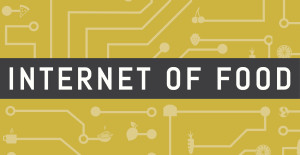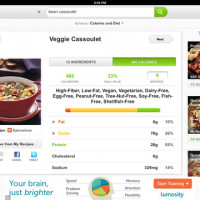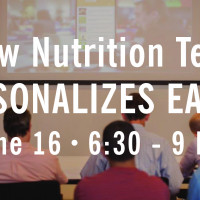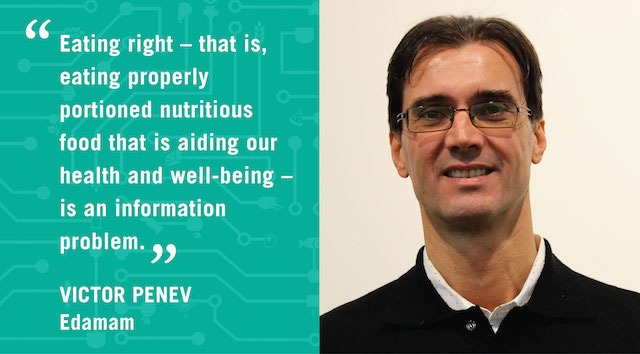
Guest post by Victor Penev, founder and CEO of Edamam on the nutrition information challenge as part of our Internet of Food Series. The views expressed are are solely those of the author and do not reflect the views of Food+Tech Connect.
Let’s face it, poor nutrition is most often the result of poor, but perfectly understandable, decisions made with poor nutrition information and data. To witness:
- We stuff up on processed foods, because we think they are cheap and easily accessible. If we knew their actual impact on our health and potential cost in medical bills, however, this calculation may change.
- We avoid cooking at home, because it seems easier and faster to order in or eat out. But if we knew how much sodium and fat we consume when eating out, we might reconsider.
- We routinely overeat, because we are unaware of the amount of calories and other nutrients packed in our supersized portions. If the calorie count of the pasta dish you eat for dinner is readily available, you might eat only half of it.
Bottom line, eating right – that is, eating properly portioned nutritious food that is aiding our health and well-being – is an information problem. If better, more actionable nutrition information is available when making food decisions, people will make better food choices. Many weight loss programs, for example, have people log what they eat, which ultimately drives a change in how much and what they eat. As the saying goes, if you can measure it, you can manage it.
Solving The Nutrition Information Problem
The good news is that the nutrition information problem is infinitely solvable. It can be broken down into three sub-problems:
- Gather and organize in one place all relevant food and nutrition information. This means data about every food, recipe, ingredient, quantity, measure, cooking technique, etc.
- “Smarten” up this database by structuring the data and building algorithms to answer real-life questions about food. An example: what is a good recipe with spinach for someone with heart condition, who has kids allergic to nuts?
- Make the “smart data” available to as wide as possible network of outlets, so you can reach people at every point they make a decision about food.
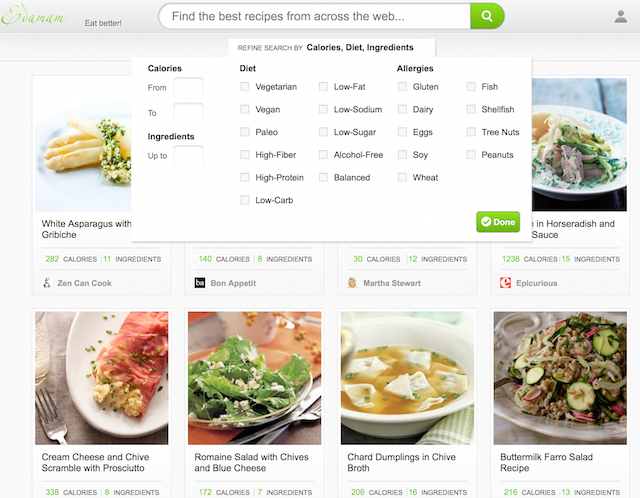
Edamam aims to solve these sub-problems of the nutrition information problem. We are relentlessly gathering and structuring food data, building algorithms to allow smart querying and partnering with businesses in the food, health and wellness space to make the data useful to their users. In the process, we hope to change the way people eat by giving them the option of a smarter, better informed food choice every time they make one.
Of course, this is not a one-company solution. Initiatives such as GS1 and legislation to make nutrition labeling in restaurants mandatory are examples of the efforts that should happen at the individual, business and government levels.
Another crucial part of the solution is logging and tracking food consumption. Companies such as Apple, FitBit and LoseIt, for example, make it easier for consumers to track their diet and nutrition, as well as their impact on weight, sleep, mood and overall health. The challenge, however, is that people still have to take the time and effort to log their meals.
The true tipping point will come the moment food logging becomes as easy and as tracking movement is today. When people are able to seamlessly track what they eat, it will become much easier to deliver personalized nutrition advice and recommendations. Applications will be able to match food and nutrition data against personal phenome, genome, microbiome and diet preference data to provide people with the best nutrition plan for them. This is not a remote possibility. With the current state of technology, this will likely be a reality in 5 to 10 years.
As food and nutrition have repeatedly been linked to overall health and longevity, the promise of solving the nutrition information problem will mean longer, healthier and happier lives. The age when we might live on average 120 years by just eating right is nigh, and this is something to cheer about.
Internet of Food is an editorial series exploring how we might use technology, new business models and design to guarantee healthy, safe and sufficient food for everyone. Join the conversation between March 23 and April 29. Share your ideas in the comments, on Twitter using #internetoffood, Facebook, Instagram or LinkedIn, and follow the conversation by subscribing to our newsletter.
________________
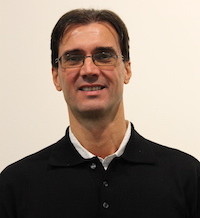 Victor Penev is a serial entrepreneur and the founder and CEO of Edamam. Previous to Edamam, Victor co-founded and sold Bulgaria’s largest Internet Company, NetInfo BG. Victor Penev also ran the international digital business of Playboy Enterprises, and was instrumental in starting the digital marketing efforts of BMG and in creating key e-commerce capability for Bertelsmann’s book clubs. He holds MBA from Stanford.
Victor Penev is a serial entrepreneur and the founder and CEO of Edamam. Previous to Edamam, Victor co-founded and sold Bulgaria’s largest Internet Company, NetInfo BG. Victor Penev also ran the international digital business of Playboy Enterprises, and was instrumental in starting the digital marketing efforts of BMG and in creating key e-commerce capability for Bertelsmann’s book clubs. He holds MBA from Stanford.

